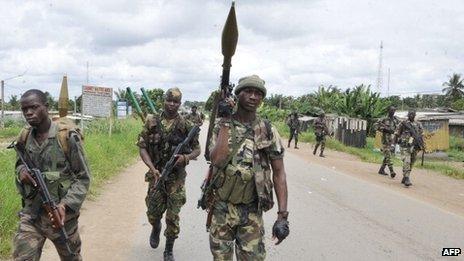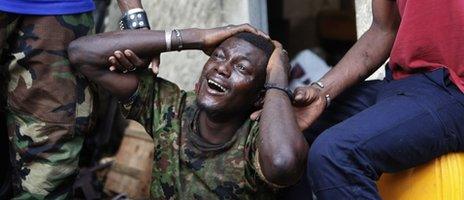Gbagbo transfer to The Hague shocks supporters
- Published
- comments

Forces loyal to President Alassane Ouattara captured the main city, Abidjan, in April
There is a palpable sense of shock on the streets of Ivory Coast's main city, Abidjan, following the transfer of ousted President Laurent Gbagbo to The Hague to face war crimes charges.
True, President Alassane Ouattara had been firm since he took power in April that Mr Gbagbo would face justice at The Hague, and those close to him worked hard to make sure the transfer happened before the 11 December legislative elections.
But there was always a hope among Gbagbo supporters that things would eventually be settled through some sort of deal that would set judicial questions aside in a bid for reconciliation.
About 3,000 people were killed in violence after Mr Gbagbo refused to accept defeat in presidential polls last November.
He was eventually captured in the presidential compound by pro-Ouattara forces, backed by French troops and UN peacekeepers.
"Adieu reconciliation" reads the front page of Notre Voie, the official newspaper of Mr Gbagbo's Ivorian Popular Front (FPI) party, which prints a black front cover this morning.
The other pro-Gbagbo newspapers are equally strong: "The Shame" writes Le Temps, controlled by Mr Gbagbo's second wife, Nady Bamba.
Le Nouveau Courrier runs a headline with a quote attributed to Mr Gbagbo as he left the country: "Don't cry, be strong."
The pro-Ouattara press are notably more subdued, often sticking to the facts of Mr Gbagbo's transfer to The Hague.
The only note of triumph comes on the front page of Le Patriote, the newspaper of Mr Ouattara's Rally of Republicans party, which reads "Gbagbo - the end".
'Clearing the air'
The transfer draws a line under talk of an imminent comeback by Mr Gbagbo or indeed the sort of miraculous intervention promoted by various prophets who fortified his inner circle with predictions of divine acts.

Disputed elections triggered violence
While there was one unconfirmed report of a minor protest in the upmarket Cocody area of Abidjan, the main effect of the news so far has been the withdrawal of a number of small pro-Gbagbo parties from the national assembly elections.
A joint statement by Mel Eg Theodore, Kabran Appia and Gervais Coulibaly said they were withdrawing their candidacies because the transfer "doesn't confirm to Ivorian law [and] doesn't help national reconciliation".
In Korhogo, the pro-Ouattara northern town where Mr Gbagbo had been in detention since his capture in April, several residents drew the opposite conclusion.
"The majority of people here are happy to see Gbagbo go - it helps clear the air and helps all sides of the political spectrum to move on," said schoolteacher Mamadou Daniogo.
Campaigning for the national assembly elections is due to start next week but with Mr Gbagbo's FPI party not taking part, the transfer to The Hague is unlikely to have much of a political impact.
For the moment, there is limited appetite for street protests among the wider population and pro-Gbagbo political meetings have ended in violent confrontations with pro-Ouattara soldiers.
For many Ivorians, the transfer of Mr Gbagbo to The Hague is a tragic end to the political career of a populist and charismatic history professor, who simply was not ready to leave power.
Nearly a year ago, on 1 December, the then head of the UN peacekeeping mission, Young-Jin Choi, had a private one-hour discussion with Mr Gbagbo and warned him of the consequences if he refused to accept the outcome of the presidential election held three days earlier.
"If you defy the result of the election and there is bloodshed, what will be your place in history, Mr President?" Mr Choi asked him.
"We were sending him signals all the time," Mr Choi told me in an interview just before leaving his job in August.
"We said: 'If you cross the line, then there will be investigations into human rights violations and perhaps even the international court.'
"He was quite taken aback but said: 'I cannot abdicate because of this fear.' Abdication is not a democratic word," says Mr Choi.
In The Hague, Mr Gbagbo will have a lot of time to dwell on the events of that decisive week 12 months ago.
The wheels of international justice are known to turn slowly.